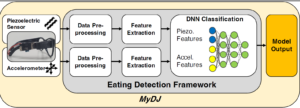Various automated eating detection wearables have been proposed to monitor food intakes. While these systems overcome the forgetfulness of manual user journaling, they typically show low accuracy at outside-the-lab environments or have intrusive form-factors (e.g., headgear). Eyeglasses are emerging as a socially-acceptable eating detection wearable, but existing approaches require custom-built frames and consume large power. We propose MyDJ, an eating detection system that could be attached to any eyeglass frame. MyDJ achieves accurate and energy-efficient eating detection by capturing complementary chewing signals on a piezoelectric sensor and an accelerometer. We evaluated the accuracy and wearability of MyDJ with 30 subjects in uncontrolled environments, where six subjects attached MyDJ on their own eyeglasses for a week. Our study shows that MyDJ achieves 0.919 F1-score in eating episode coverage, with 4.03× battery time over the state-of-the-art systems. In addition, participants reported wearing MyDJ was almost as comfortable (94.95%) as wearing regular eyeglasses.
